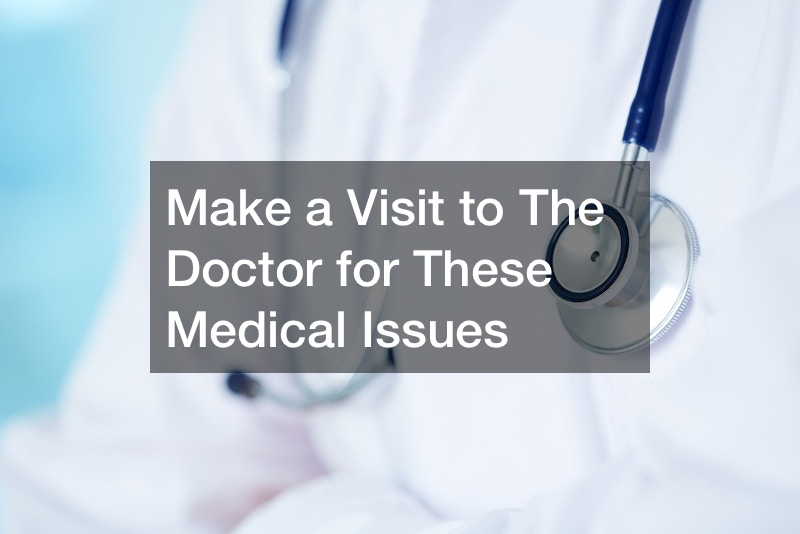It’s often hard to tell when it’s time for a visit to the doctor. Most people ignore their issues because they have other, more pressing things to focus on. They put off anything that may cause trouble. That’s a big mistake because making an appointment as early as possible with a physician can prevent even more significant problems. Let’s discover all the issues requiring medical attention.
1. Eye Issues
Eye issues are the hardest to ignore unless they happen so gradually that you don’t notice anything different until it’s too late. For example, some people don’t realize their eyesight isn’t as perfect as it used to be. They make up for it by squinting when they should start looking into eye care. Instead, they try natural remedies to improve eyesight, such as eating carrots or adding more vitamins to their daily diet. However, the best you can do is set up a visit to the doctor.
You must also see an optometrist when you notice weird symptoms because catching things can prevent difficult and expensive operations and treatments. If you have sudden vision loss in one or both eyes, go to a professional. You may be dealing with glaucoma or retinal detachment, requiring immediate medical attention. People who get cataracts treatment early can often avoid the more complicated and risky surgeries.
Eye infections are common issues that need medical assessment. You must see the doctor to get the right prescription if you notice redness, odd oozing substances, pain, blurred vision, and light sensitivity. You should also get it checked if you notice eye floaters, which are those small lines that may appear in your vision. If they don’t go away quickly, contact your optometrist. Other symptoms, such as constant headaches, could indicate eye issues. Moreover, anyone with diabetes should pay attention to their eyesight.
2. Back Issues
Most people think having back pain is normal because it’s common. It’s only familiar because everyone tends to ignore it. No pain is natural, and the best you can do is plan a visit to the doctor. Any kind of discomfort indicates inflammation in your body, which is caused by several factors. You could have joint, muscular, or nerve dysfunction. Sometimes, there are issues with the structure of your spine, and you must take this situation seriously to avoid suffering in the long run.
A one-time back ache may not be cause for concern, especially if it disappears after a good night’s sleep and mild pain medication. It could be a superficial strained muscle caused by your daily activities. However, any persistent problem must be checked by a doctor before it turns into something else. You should also seek help if your back pain starts extending beyond that area of your body, mainly if it travels to your leg. That’s an indication of something urgent, like a damaged disk.
Back issues may also develop into numbness or tingling in your limbs. Any kind of weakness needs to be assessed quickly because it could be the consequence of another health problem, such as low hemoglobin or vitamin deficiency. If you’ve constantly suffered from back aches due to an accident and haven’t found relief yet, you need to check with a physician. Back pain accompanied by other symptoms, like sudden weight loss, fevers, or bowel movement troubles, must be treated ASAP.
3. Mental Health Needs
The easiest medical issue to ignore is your mental health. Mental well-being has only gotten mainstream attention in the last few decades. Most people still think that their behavior, thoughts, and moods are private and should be handled by each individual. However, these disorders are real and can affect your integrity just as physical symptoms. Some illnesses don’t require immediate attention, but you must stay vigilant.
When mental disorders get serious, people will require a visit to the doctor. You could visit your primary care physician, who will refer you to a psychologist or psychiatrist. If things get too severe, a health center with in-patient treatments may be in order. The idea is to avoid that by staying on top of your mental condition and understanding that things will only worsen if they’re not addressed correctly and promptly.
The most common illnesses are depression, anxiety, schizophrenia, and addictive patterns. Schizophrenia is a severe condition that needs to be handled delicately, and patients are usually treated because it’s much more evident. However, other mental diseases are not taken seriously due to their subtlety. You must still be diagnosed by a professional who will recommend different treatments, such as medication and behavioral therapies, to overcome the situation. Don’t disregard your mental health just because it’s easier.
4. Orthopedic Issues
Like back pains, many people ignore issues with their muscles, joints, and bones or only treat it with over-the-counter painkillers and some rest. These things may eventually affect your mobility, so getting a checkup from an orthopedic specialist is much better. Before that, it’s essential to understand what you should watch out for and the symptoms that fall under the orthopedic field. First, you should analyze any stiffness, soreness, or discomfort, primarily if it affects your daily tasks.
If you start experiencing chronic pain, meaning it lasts over 12 weeks and has you popping too many painkillers, it’s time to see a specialist. Losing any range of motion is a significant indicator of a real issue. You’ll lose some mobility as you age, but it shouldn’t happen from one day to another. It’s gradual, so contact a specialist if you suddenly can’t lift your arm or leg. Issues while walking or standing are also signs that you need a visit to the doctor.
A less notable indicator is having soft tissue after an injury that doesn’t improve in a few days. Orthopedic doctors treat joint, muscle, and bone pain after a trauma. They repair torn tendons, check for dislocation or instability, and treat hip and knee issues that worsen over time or if they get affect your ability to carry any weight. Their other specialties may include arthritis, osteoarthritis, and pinched nerves.
5. Allergy Issues
Allergy issues start developing in youth, so parents must pay attention and get their children adequately checked to determine their triggers. Many people can’t have nuts or shellfish products, as those are common allergies. Other reactions are much more subtle, and the symptoms may be difficult to treat. If someone ate a nut or was near their allergen, they may need antihistamines. Sometimes, the over-the-counter medication works perfectly.
However, not all allergies present in the same way. More people in the last few years have discovered gluten sensitivity, but they would need to visit a gluten allergy doctor to get the actual diagnosis. The symptoms of that may not always present as rashes or a sore throat. Instead, patients may have bloated stomachs, constipation, and other gastrointestinal conditions. In that case, they most likely have to avoid gluten products.
Therefore, a visit to the doctor specializing in allergies is in order. Most also treat asthma and are trained to detect the triggers of this condition. They’ll also conduct some tests to check for other possible issues, and it’s better to be safe if you’ve noticed your child’s sensitivity to several substances and foods. You should also schedule an appointment with an allergist if you have a stuffed nose or cough and sneeze frequently.
6. Ear Issues
Ear issues can be an incredible nuisance, but the most common problem, an ear infection, is easy to treat if you visit the doctor and get the proper treatment. Unfortunately, too many people believe that some ear infections, inflammation, and pains will go away on their own. That’s usually not the case. You’ll need a prescription from the ear doctor to entirely eliminate the issue. You should also know that infections will become major problems if left untreated.
People tend to get medical attention for their ears when they’re in tremendous physical pain. Sometimes, the ache extends beyond the canal and becomes a raging headache that won’t go away with acetaminophen or ibuprofen. Seeing a specialist is your best bet, so try to find an otolaryngologist to check everything that could be wrong with your ears, throat, and nose. However, infections are not your only concern.
Ear problems are varied; some may indicate severe conditions like tumors, while others may be due to your habits. For example, if you experience mild hearing loss, don’t panic. Sometimes, it’s because ear wax has accumulated deeply in the canal, sealing most parts and obstructing sound from entering. A specialist can clean it up correctly. On the other hand, you may experience tinnitus, Meniere’s disease, and ear barotrauma.
7. Women’s Needs
Women have complicated bodies, so several specialists are dedicated to womens health, particularly gynecology and obstetrics. Women are designed to withstand pain, meaning they’ll try to avoid a visit to the doctor at all costs, especially if the physician has to examine their uterus and private parts. However, going to a gynecologist regularly is essential because many female issues aren’t easy to notice.
Pregnant women must be even more vigilant for their baby’s sake. Pregnancy can lead to complications during the gestational period and labor. Any symptom, such as spotting or unexpected pain, must be checked out. Most people underestimate how risky getting pregnant is for any woman because these problems are not discussed enough. It’s time to break that pattern and visit the obstetrician as much as needed during those nine months.
Gynecologists treat conditions such as reproductive tract and breast cancers, tumors, infertility, problems with tissues that support the pelvis, and more. They deal with STIs, polycystic ovary syndrome, incontinence, genital ulcers, fibroids, etc. Obstetricians are in charge of delivering the baby and checking that everything is alright, but they also treat preeclampsia, miscarriages, placenta abruption, gestational diabetes, etc. Many are also in charge of surgeries, such as an episiotomy, cervical cerclage, and using forceps to deliver babies.
8. Hip Issues
While an orthopedist may be able to treat your hip pain, you should also consider going to a hip doctor. It’s always recommended to see a specialist when a medical issue hinders your life. Chronic hip issues are a big deal because they’ll affect how you walk and move for the rest of your life. The last thing you want is to become dependent on others or have to use a walker or wheelchair at a young age.
Age plays a significant role in how people move, as their bones and muscles may not be so agile after so many years. However, that doesn’t mean you must sit back and take what’s coming. You can retain your independence if you get treatment as soon as possible. Naturally, you should also seek medical attention after an accident or injury.
Pay attention to how long you can remain standing or walking before your hip starts acting up. You may not realize how this pain will start limiting your life. The change doesn’t happen overnight, but it’ll soon become evident. Contact your doctor if your hip pain extends to your knee, legs, feet, etc., or affects your sleep patterns. Start with your primary care physician and get a referral.
9. Tooth Alignment Issues
Problems with tooth alignment can affect your everyday life. You won’t be able to maintain proper oral hygiene because some teeth become unreachable, even with a great toothbrush and floss routine. Therefore, you must consider getting braces, whether traditional metal ones or clear aligners. You’ll need a visit to the doctor, specifically an orthodontist.
Some people think that crooked teeth aren’t a problem and that braces are only for vain people who want perfect smiles. However, this misalignment can lead to other issues aside from cavities. For example, you may develop an overbite or underbite, affecting how you eat and speak. It may also cause pain, or you could bite your tongue or cheeks often.
Other conditions include teeth grinding, mouth clenching, mouth breathing, and inability to close your mouth correctly. Therefore, you must research, see a specialist, and start planning your treatment. If you have children and notice any problems, you should schedule an appointment with a dentist and an orthodontist soon. It’s much better to start aligning teeth at a young age to prevent complications later.
Now that you understand the medical issues that will require a visit to the doctor, it’s time to stop ignoring them. Make an appointment as soon as possible to prevent bigger problems, like surgeries or chronic pain. You must be smart about your health, so call your physician today.







